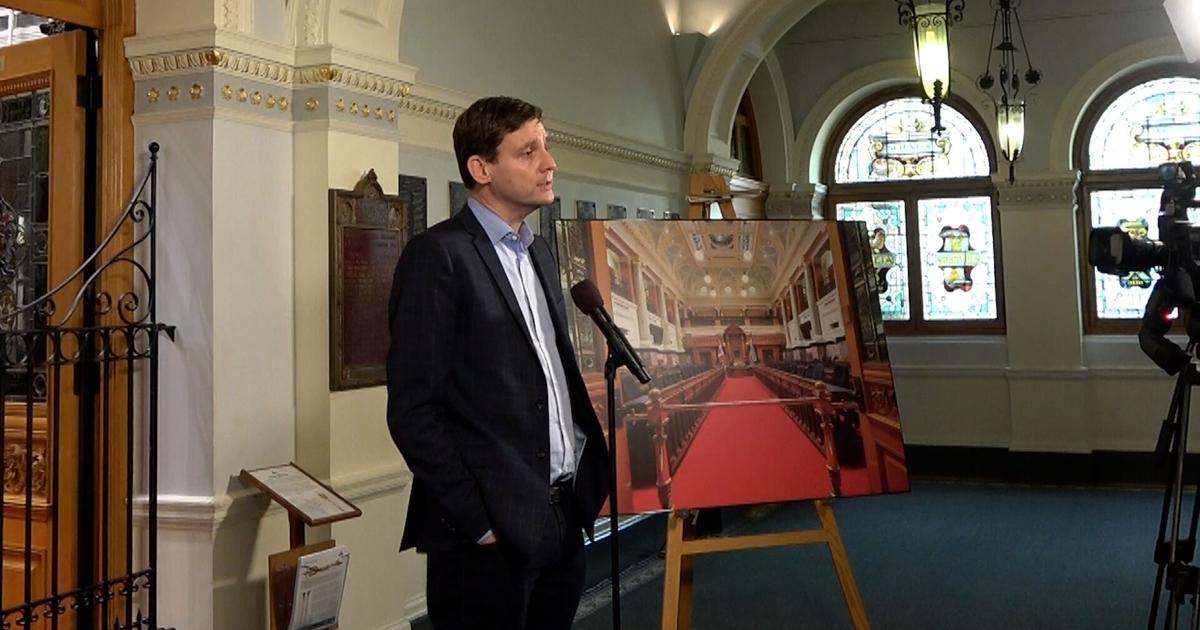News
Wave of strikes in Canada could cause ‘knock-on effect’ in other sectors, experts warn – Global News
While a new tentative deal may have been reached between the two sides involved in a labour dispute impacting thousands of B.C. port workers, experts say Canada may not have seen the last of strikes this year.
From the B.C. port strike to the recent Greater Toronto Area Metro workers’ strike to the writers’ strike in the U.S., rising costs of living, high corporate profits and dissatisfaction among workers may all be contributing to collective action across sectors.
Simon Black, associate professor of labour studies at Brock University, said that while these present-day examples may not be at the same level as the strike waves of the 1970s and the late 1940s, all signs point towards large-scale dissatisfaction.

“Workers have seen their real wages, their purchasing power, eroding a great deal under this inflationary period. And yet, large corporations have made record gains, while working class households have struggled. I think there’s good evidence that the corporate profits and not workers’ wages have contributed disproportionately to inflation,” Black said.
Moshe Lander, economics professor at Concordia University, said the latest strike waves are driven by a desire to recover some of the lost purchasing power.
“You’re having, essentially, a showdown that’s dealing with how we recover the lost money or the redistribution of that money during high inflation.”
More on Canada
For 13 days this month beginning July 1, some 7,400 port workers at 30 ports in B.C. walked off the job, stalling billions worth of cargo from moving in or out at some of Canada’s busiest terminals. A tentative deal was reached late Sunday night, which labour minister Seamus O’Regan said would mean “long-term stability”.
“We know sometimes labour negotiations can be extremely difficult, but every step of the way, Minister O’Regan has been there to encourage people at the table to make sure that we’re getting towards a solution,” Prime Minister Justin Trudeau said while speaking to reporters on Monday.
“And yes, there have been concerns and worries about how things are unfolding over the past days, but we now have a situation where there is another offer, there is another potential deal on the table, and we’re, as always, hopeful that that negotiation at the bargaining table continues to be at the centre of what everyone needs to continue to do.”
On Friday, Metro grocery stores across the Greater Toronto Area shut down as thousands of grocery store employees went on strike. Unifor, the largest private-sector union, says some 3,700 front-line store employees walked off the job just after midnight.
It says members of Local 414 rejected a tentative labour deal reached last week, but provided few other details. In a statement on Friday, Metro said it was “extremely disappointed that its unionized employees at 27 Metro locations across the Greater Toronto Area (GTA) rejected the agreement reached last week and decided to go on strike effective July 29, even though the union bargaining committee unanimously recommended the agreement to its members.”

This recent wave of strikes come as Canadian workers are feeling the pinch of higher costs.
A PwC survey released on Monday found 42 per cent of Canadian workers say that while their household can pay its bills, they have nothing left over for savings.
Another 14 per cent say their household struggles to pay its bills.
“Work pressures are also acute, with only 22% saying their workload was often or usually manageable in the last 12 months. Many of these issues have been ongoing for some time, but an additional force of disruption emerged this year with the very rapid rise of generative artificial intelligence,” the report said.
In addition to cost of living concerns, Lander said the Screen Actors Guild strike in the United States is an illustration of how anxieties around the use of artificial intelligence could also be contributing to labour action.
Black said workers’ strike action will continue unless economic conditions change.
“I think if these conditions persist — tight labour markets and inflation — workers are going to continue to make demands of their employers, unionized workers, and likely exercise their right to strike. Because they are going to have to play catch–up now.”
He said purchasing power of the working class has eroded so much that easing inflation may not help, either.
“Even if we see a loosening of labour markets, even if we continue to see inflation decline, we’ll continue to see workers willing … to go on strike to push their demands.”
The latest reading in Canada showed overall inflation cooled to 2.8 per cent in June, marking a substantial drop from the peak of 8.1 per cent for the same month last year.
However, some measures, such as grocery prices, remained high.

Black said that while only employees in unionized workplaces are likely to strike, all workers across the Canadian economy are feeling the pinch of rising costs of living.
Employers, however, have asked striking unions to not be unreasonable in their demands. In April, during the Public Service Alliance of Canada (PSAC) strike, then-Treasury Board president Mona Fortier had said PSAC should be “prepared to compromise” to reach a deal with the federal government because it can’t “write a blank cheque” to them.
According to Black, workers may not respond well to such appeals.
“Workers aren’t dumb,” he said. “They know the record profits of the likes of Loblaws and Metro.”
Lander said the pandemic only exacerbated this feeling of inequality.
“Having come out of COVID, workers are angry because it’s now unacceptable that shareholders who were able to passively sit at home and not have to put themselves on the front line of the years of COVID and what that could do, they’re saying, well, now I want that share for me.”
Loblaw, which was accused of profiteering off of high food inflation, defended itself in February.

“Retail prices are not growing faster than costs, the company is not taking advantage of inflation to drive profit,” Loblaw CFO Richard Dufresne had said in an earnings call in February. Earlier this month, while reporting its latest quarterly earnings, the grocer blamed high supplier costs for rising food prices.
High food inflation had little impact on the profits of Metro Inc., which rose by 10.4 per cent last quarter.
Rising cost of living is not the only factor making public anger worse. Lander said that record temperatures this summer aren’t helping. “People tend to be angrier, tend to be more frustrated easily, tend to be more exhausted during periods of extreme heat,” he said.
Black and Lander agreed that strikes in one sector could have a domino effect on other sectors.
“If a public sector union can negotiate a 12-per cent wage increase over three years and another union goes to their employers and say, I want the 12 per cent over three or I want more than 12 per cent over three, how does the employer turn around and say, no, you can’t have that when another union’s already agreed to it?,” Lander said.
Black added: “This is what happens when we see a strike action. We see workers learning from other workers.”
“There’s a knock-on effect that other workers see that and learn from that. And so yes, we can see this kind of this kind of activity spread throughout the economy, to different sectors.”
— with files from The Canadian Press and Global News’ Aaron D’Andrea
News
Toronto Sceptres open camp ahead of second PWHL season |

The Toronto Sceptres have opened training camp for the upcoming PWHL season, with a new logo, new colours, new jerseys and a new primary venue in Coca-Cola Coliseum. The team has a lot to look ahead to after a busy off-season and successful inaugural campaign. (Nov. 12, 2024)
News
Major shakeup at Canada Soccer in wake of drone-spying scandal |

After a lengthy independent report on the Summer Olympic drone-spying scandal, Canada Soccer says women’s head coach Bev Priestman, assistant coach Jasmine Mander and analyst Joey Lombardi will not be back with the organization. It found the “practice of conducting surreptitious surveillance of opponents” predated this summer’s Paris Olympics. Former coach John Herdman has yet to give evidence. (Nov. 12, 2024)
News
Eby pays tribute to former B.C. premier John Horgan |

B.C. Premier David Eby says John Horgan was an inspirational leader who guided the province’s New Democrats out of the political wilderness after 16 years in Opposition. Eby says his predecessor as premier, who has died after a third bout with cancer, was known for his compassion for people from all walks of life but also his sharp tongue. (Nov. 12, 2024)
-

 News24 hours ago
News24 hours agoWaymo’s robotaxis now open to anyone who wants a driverless ride in Los Angeles
-

 News24 hours ago
News24 hours agoWorld’s largest active volcano Mauna Loa showed telltale warning signs before erupting in 2022
-

 Sports24 hours ago
Sports24 hours agoPWHL MVP Spooner set to miss start of season for Toronto Sceptres due to knee injury
-

 News24 hours ago
News24 hours ago‘The Bidding War’ taps into Toronto’s real estate anxiety |
-

 Business23 hours ago
Business23 hours agoJapan’s SoftBank returns to profit after gains at Vision Fund and other investments
-

 News13 hours ago
News13 hours agoChrystia Freeland says carbon rebate for small businesses will be tax-free
-

 News23 hours ago
News23 hours agoSTD epidemic slows as new syphilis and gonorrhea cases fall in US
-

 News12 hours ago
News12 hours agoFormer B.C. premier John Horgan, who connected with people, dies at 65

























